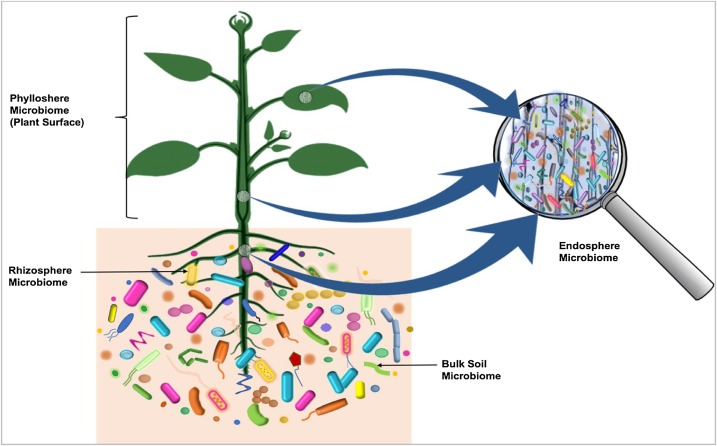Microbiota
 Microbiota are the range of microorganisms that may be commensal, mutualistic, or pathogenic found in and on all multicellular organisms, including plants. Microbiota include bacteria, archaea, protists, fungi, and viruses, and have been found to be crucial for immunologic, hormonal, and metabolic homeostasis of their host.
Microbiota are the range of microorganisms that may be commensal, mutualistic, or pathogenic found in and on all multicellular organisms, including plants. Microbiota include bacteria, archaea, protists, fungi, and viruses, and have been found to be crucial for immunologic, hormonal, and metabolic homeostasis of their host.The term ''microbiome'' describes either the collective genomes of the microbes that reside in an ecological niche or else the microbes themselves.
The microbiome and host emerged during evolution as a synergistic unit from epigenetics and genetic characteristics, sometimes collectively referred to as a holobiont. The presence of microbiota in human and other metazoan guts has been critical for understanding the co-evolution between metazoans and bacteria. Microbiota play key roles in the intestinal immune and metabolic responses via their fermentation product (short-chain fatty acid), acetate. Provided by Wikipedia
1
By:
Olarte-Castillo, Ximena A., Antolínez-Delgado, Carlos Andrés, Olarte-Castillo, Ximena A., Antolínez-Delgado, Carlos Andrés, Microbiota
Published: 2022-05-09
Published: 2022-05-09
Fuente: Universidad EIA
Tipo de material: Artículo de revista
2
By:
Olarte-Castillo, Ximena A., Antolínez-Delgado, Carlos Andrés, Olarte-Castillo, Ximena A., Antolínez-Delgado, Carlos Andrés, Microbiota
Published: 2022-05-09
Published: 2022-05-09
Fuente: Universidad EIA
Tipo de material: Artículo de revista
3
By:
Guerra Sierra, Beatriz Elena, Muñoz Guerrero, Jaider, Sokolski, Serge, Guerra Sierra, Beatriz Elena, Muñoz Guerrero, Jaider, Sokolski, Serge, Microbiota
Published: 2021-03-27
Published: 2021-03-27
Fuente: Universidad EIA
Tipo de material: Artículo de revista
4
By:
Marín, Jaime, Rincón-Barón, Edgar Javier, Montoya-Lerma, James, Marín, Jaime, Rincón-Barón, Edgar Javier, Montoya-Lerma, James, Microbiota
Published: 2020-07-03
Published: 2020-07-03
Fuente: Universidad EIA
Tipo de material: Artículo de revista
5
By:
Guerra Sierra, Beatriz Elena, Muñoz Guerrero, Jaider, Sokolski, Serge, Guerra Sierra, Beatriz Elena, Muñoz Guerrero, Jaider, Sokolski, Serge, Microbiota
Published: 2021-03-27
Published: 2021-03-27
Fuente: Universidad EIA
Tipo de material: Artículo de revista
6
By:
Marín, Jaime, Rincón-Barón, Edgar Javier, Montoya-Lerma, James, Marín, Jaime, Rincón-Barón, Edgar Javier, Montoya-Lerma, James, Microbiota
Published: 2020-07-03
Published: 2020-07-03
Fuente: Universidad EIA
Tipo de material: Artículo de revista
7
By:
Muñoz-Guerrero, Jaider, Guerra-Sierra, Beatriz Elena, Alvarez, Javier C., Muñoz-Guerrero, Jaider, Guerra-Sierra, Beatriz Elena, Alvarez, Javier C., Microbiota
Published: 2021-04-01
Published: 2021-04-01
Fuente: Universidad EIA
Tipo de material: Artículo de revista
8
By:
Muñoz-Guerrero, Jaider, Guerra-Sierra, Beatriz Elena, Alvarez, Javier C., Muñoz-Guerrero, Jaider, Guerra-Sierra, Beatriz Elena, Alvarez, Javier C., Microbiota
Published: 2021-04-01
Published: 2021-04-01
Fuente: Universidad EIA
Tipo de material: Artículo de revista
9
By:
Caicedo-Jiménez, Nazly Julieth, Guerra-Sierra, Beatriz Elena, Caicedo-Jiménez, Nazly Julieth, Ortíz-Meneses, Fredy Alejandro, Contreras-Contreras,Sandra Lorena, Grupo microbiota
Published: 2023-09-15
Published: 2023-09-15
Fuente: Universidad EIA
Tipo de material: Trabajo de grado - Pregrado
10
By:
Alvarez-Ballesteros, Daniela, Ortiz-Meneses, Fredy Alejandro, Alvarez-Ballesteros, Daniela, Chacín-Zambrano, Christian-Andrei, Sandoval-Meza, Adriana Ximena, Ciencias Naturales y Biológicas - Microbiota
Published: 2023-06-14
Published: 2023-06-14
Fuente: Universidad EIA
Tipo de material: Trabajo de grado - Pregrado
11
By:
Guerra-Sierra, Beatriz Elena, Sandoval-Meza, Adriana Ximena, García-Sanchéz, Liliana Torcoroma, Guerra-Sierra, Beatriz Elena, Sandoval-Meza, Adriana Ximena, García-Sanchéz, Liliana Torcoroma, Microbiota
Published: 2019-04-01
Published: 2019-04-01
Fuente: Universidad EIA
Tipo de material: Artículo de revista
12
By:
Gomez-Hurtado, Karen Dayanna, Ortiz-Meneses, Fredy Alejandro, Guerra-Sierra, Beatriz Elena, Gomez-Hurtado, Karen Dayanna, Chacin-Zambrano,Christian Andrei, Antolinez-Delgado, Carlos Andres, MICROBIOTA
Published: 2022-11-25
Published: 2022-11-25
Fuente: Universidad EIA
Tipo de material: Trabajo de grado - Pregrado
13
By:
Guerra-Sierra, Beatriz Elena, Sandoval-Meza, Adriana Ximena, García-Sanchéz, Liliana Torcoroma, Guerra-Sierra, Beatriz Elena, Sandoval-Meza, Adriana Ximena, García-Sanchéz, Liliana Torcoroma, Microbiota
Published: 2019-04-01
Published: 2019-04-01
Fuente: Universidad EIA
Tipo de material: Artículo de revista
14
By:
Rincón-Barón, Edgar Javier, Grisales-Echeverri, Claudia, Cuaran, Viviana Lucia, Cardona-B., Nadya Lorena, Rincón-Barón, Edgar Javier, Grisales-Echeverri, Claudia, Cuaran, Viviana Lucia, Cardona-B., Nadya Lorena, Microbiota
Published: 2020-07-03
Published: 2020-07-03
Fuente: Universidad EIA
Tipo de material: Artículo de revista
15
By:
Rincón-Barón, Edgar Javier, Grisales-Echeverri, Claudia, Cuaran, Viviana Lucia, Cardona-B., Nadya Lorena, Rincón-Barón, Edgar Javier, Grisales-Echeverri, Claudia, Cuaran, Viviana Lucia, Cardona-B., Nadya Lorena, Microbiota
Published: 2020-07-03
Published: 2020-07-03
Fuente: Universidad EIA
Tipo de material: Artículo de revista
16
By:
Rincon-Baron, Edgar Javier, Guerra-Sierra, Beatriz Elena, Restrepo Zuluaga, David Esteban, Espinosa-Matías, Silvia, Rincon-Baron, Edgar Javier, Guerra-Sierra, Beatriz Elena, Restrepo Zuluaga, David Esteban, Espinosa-Matías, Silvia, Microbiota
Published: 2019-12-05
Published: 2019-12-05
Fuente: Universidad EIA
Tipo de material: Artículo de revista
17
By:
Ortiz-Meneses, Fredy Alejandro, Guerra-Sierra, Beatriz Elena, Osorio-Alvarado, Carlos Enrique, Rodriguez-Gonzalez, Leidy, Ortiz-Meneses, Fredy Alejandro, Guerra-Sierra, Beatriz Elena, Osorio-Alvarado, Carlos Enrique, Rodriguez-Gonzalez, Leidy, Microbiota
Published: 2022-02-01
Published: 2022-02-01
Fuente: Universidad EIA
Tipo de material: Artículo de revista
18
By:
Rincón-Barón, Edgar Javier, Gutierrez-Rodriguez, Ana Mariany, Guerra-Sierra, Beatriz Elena, Espinosa Matías, Silvia, Rincón-Barón, Edgar Javier, Gutierrez-Rodriguez, Ana Mariany, Guerra-Sierra, Beatriz Elena, Espinosa Matías, Silvia, Microbiota
Published: 2020-02-13
Published: 2020-02-13
Fuente: Universidad EIA
Tipo de material: Artículo de revista
19
By:
Rincon-Baron, Edgar Javier, Guerra-Sierra, Beatriz Elena, Restrepo Zuluaga, David Esteban, Espinosa-Matías, Silvia, Rincon-Baron, Edgar Javier, Guerra-Sierra, Beatriz Elena, Restrepo Zuluaga, David Esteban, Espinosa-Matías, Silvia, Microbiota
Published: 2019-12-05
Published: 2019-12-05
Fuente: Universidad EIA
Tipo de material: Artículo de revista
20
By:
Ortiz-Meneses, Fredy Alejandro, Guerra-Sierra, Beatriz Elena, Osorio-Alvarado, Carlos Enrique, Rodriguez-Gonzalez, Leidy, Ortiz-Meneses, Fredy Alejandro, Guerra-Sierra, Beatriz Elena, Osorio-Alvarado, Carlos Enrique, Rodriguez-Gonzalez, Leidy, Microbiota
Published: 2022-02-01
Published: 2022-02-01
Fuente: Universidad EIA
Tipo de material: Artículo de revista
